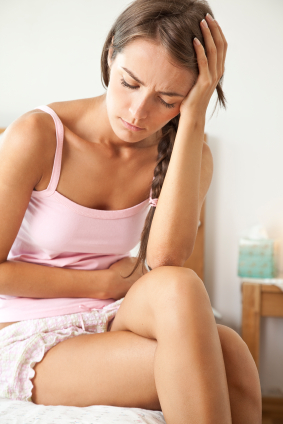Antidepressants for PMS? Think Again!
A report revealed that only some symptoms of premenstrual syndrome (PMS) improve with the use of antidepressants. Researchers discovered that women with multiple physical and psychological symptoms were the most likely to see improvement, while women with mainly physical symptoms received little help.
These symptoms include bloating, breast tenderness, mood swings, irritability, food cravings, migraines, weight gain, depression, and anxiety. PMS can be severe enough to disrupt women’s daily lives.
The research states that “As with any medication… a woman has to balance the likelihood of benefit with an SSRI against the risks of side effects. Potential side effects of the medications include headache, nausea, sleep problems and sexual side effects. The drugs have also been linked to an increased risk of suicidal behavior in teenagers and young adults.”
Are taking antidepressants for PMS really worth the risk? PMS is not a drug deficiency. Think about what you are putting into your body. Drugs are foreign chemicals. Why not identify the underlying cause of your PMS and resolve it naturally?
PMS can be caused by low progesterone, poor diet and nutritional deficiencies. So what can you do?
1. Balance and replenish your hormones with bioidentical progesterone.
2. Clean up your diet.
a. Remove processed and sugary foods.
b. Avoid white breads and starches, alcohol, caffeine, soft drinks/carbonated beverages (including diet drinks), hydrogenated oils, processed/refined foods (such as most pre-packaged cookies, cereal bars, crackers, etc.) and high sodium foods.
c. For optimal results, it’s best to stick to a whole food diet, including hormone-free lean meats, fresh fruits and vegetables, nuts, seeds, legumes, lentils, eggs, and whole grains in moderation.
d. Eating an adequate amount of protein is critical; protein promotes hormonal balance, and helps to balance blood sugar, which is essential because unstable blood sugar creates and aggravates mood swings.
3. Supplement your diet with vitamins and minerals. In addition to a multivitamin, research supports that the following supplements may help treat PMS: Magnesium, Vitamin B-6, Vitamin E, Evening Primrose Oil, DIM (Diindolymethane), Vitex (Chaste berry) and 5-HTP.
4. Exercising 3 – 5 times per week for at least 30 minutes and getting adequate sleep.
Antidepressants are casually prescribed to women for just about any symptom in the book, including hot flashes, fatigue, chronic pain, anxiety, panic attacks, insomnia and the symptoms of hormonal imbalance. Yet antidepressants are not the end-all, cure-all. Always do your research to find the root cause of your symptoms so that you can resolve them naturally!
Find out if you have low progesterone levels that could be causing your PMS by taking our women’s symptom checker health quiz today!

